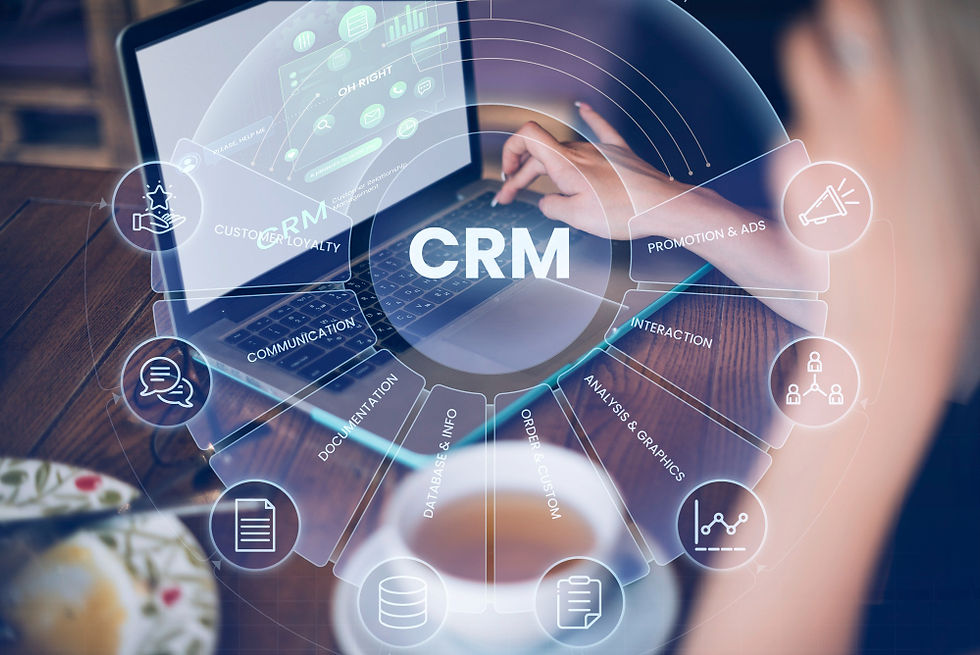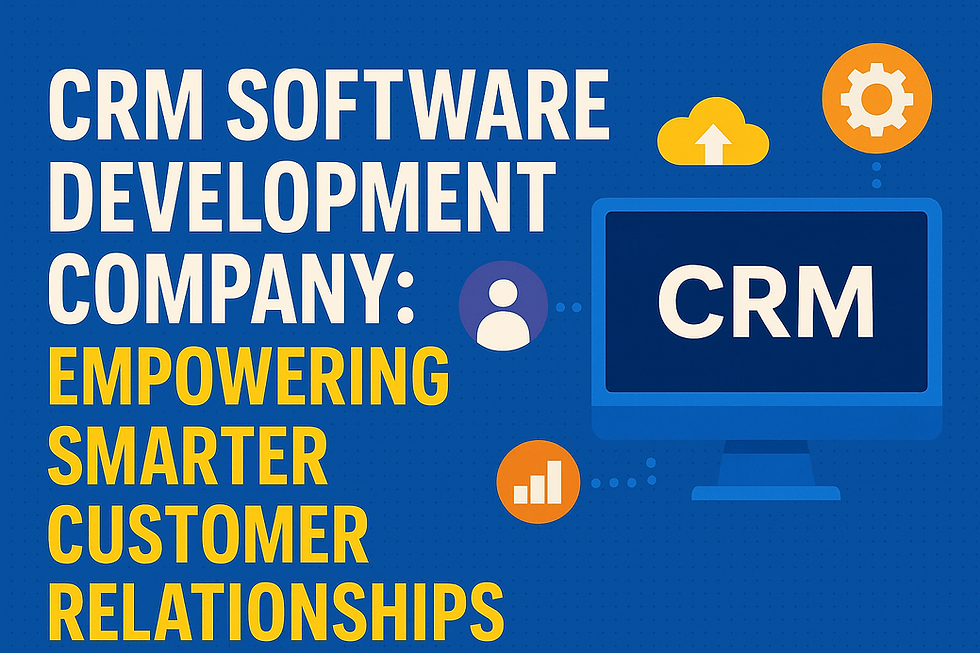Custom CRM vs. SaaS Platforms: Which Delivers Long-Term Competitive Advantage?
- Arobit Digital
- 6 days ago
- 4 min read

Deciding between SaaS and custom CRM can either make or break your business growth curve. Where 91% of businesses with more than 11 employees utilise CRM software, the actual query isn't so much about whether or not you need one—it's more about which one will power your competitive edge in the years to come. The choice determines everything from the efficiency of operations to customer happiness.
Knowing the Landscape of CRM
Customer Relationship Management has evolved from basic contact lists to advanced business intelligence systems. The CRM systems of today act as the core of sales, marketing, and customer service functions.
Contemporary enterprises provide huge volumes of customer information every day. With no correct CRM framework, such valuable data is dispersed among departments, resulting in lost opportunities and angry customers.
What Makes CRM Critical for Business Success
An effective CRM system unifies customer interactions, streamlines mundane tasks, and offers actionable insights. CRM users enjoy an average ROI of $8.71 for each dollar invested.
The appropriate CRM solution aids businesses in the following:
Monitor customer paths from initial contact to repeat buys
Recognise high-value leads and streamline sales procedures
Offer customised customer experiences at scale
Make data-driven decisions on product creation and marketing initiatives
Custom CRM Development: The Tailored Approach
Custom CRM solutions are designed especially for your business needs, processes, and industry requirements. As opposed to off-the-shelf solutions, custom development provides a system that you can work with instead of having to conform to the software.
Key Advantages of Custom CRM Solutions
Total Ownership of Features
crm development company enable you to select only the features your team requires. No paying for unused features or working with extra complexity.
Smooth Integration
Custom solutions mesh seamlessly with your current software stack, closing data silos and streamlining manual effort.
Scalability Your Way
As your company expands, your custom CRM keeps pace. Implement new features, change workflows, or increase capacity without changing platforms.
Advanced Security
With custom development, you decide on data storage, access controls, and security measures. This is especially important for companies dealing with highly sensitive customer data.
When Custom Development Makes Sense
Consider building a custom CRM if your company has:
Specialized industry processes that don't align with pre-built templates
Innovative integration needs with older systems
Security or compliance needs with strict regulations
High growth plans or expansion plans
Revenue available for long-term investment in technology infrastructure
SaaS CRM Platforms: The Plug-and-Play Solution
Software-as-a-Service CRM platforms provide pre-configured functionality with subscription pricing. These solutions can be implemented rapidly and have minimal technical requirements to begin.
Advantages of SaaS CRM Systems
Rapid Implementation: Most SaaS CRM solutions can be installed in days or weeks, and teams can begin realising benefits right away.
Lower Upfront Investment: No initial development fees or server infrastructure investments. Predictable monthly subscription billing.
Built-in Maintenance: Firms regularly update features, security patches, and performance enhancements at no extra cost or effort on your team's part.
Proven Reliability: Successful SaaS providers provide enterprise-class uptime and technical support.
Popular SaaS Options and Their Limitations
Although platforms such as Salesforce, HubSpot, and Pipedrive manage millions of users with ease, they have inherent shortcomings:
Generic workflows that do not necessarily align with your processes
Limited customization
Ongoing subscription fees that grow over time
Reliance on vendor priorities for feature improvements
Possible data portability concerns if you ever want to switch platforms
Head-to-Head Comparison: Custom vs. SaaS
Scalability and Flexibility
Custom CRM: Scales exactly as you desire, with complete flexibility for adjustments and development.
SaaS CRM: Scales within parameters established by the vendor. Limited customization available through existing settings and add-ons.
Security and Data Control
Custom CRM: Full control over data storage, encryption, and access protocols. Ideal for industries requiring strict compliance.
SaaS CRM: Vendor security controls. Robust in general, but you're relying on third-party policies and procedures.
Integration Capabilities
Custom CRM: Designed to work seamlessly with all your technology stack, including legacy systems and industry-specific solutions.
SaaS CRM: Pre-built connections to mainstream software but potentially needing workarounds for specialist or older systems.
Total Cost of Ownership
Custom CRM: More initial outlay but lower lifetime cost. No ongoing subscription charge, and you retain the intellectual property.
SaaS CRM: Lower upfront expenses but continuous subscription charges that grow as usage and features increase. Expenses can grow large over time.
Making the Right Choice for Your Business
Custom vs. SaaS CRM is a choice based on a number of important factors:
Business Size and Growth Plans
Small companies with simple processes tend to start with SaaS solutions. Expanding companies with sophisticated needs usually see greater long-term value in custom development.
Industry Requirements
Regulated sectors such as healthcare, finance, or government tend to need bespoke solutions for security or compliance reasons.
Technical Resources
Take into consideration your staff's expertise in managing and supporting various forms of systems. Bespoke solutions can demand more technical know-how internally or in partnerships.
Budget Considerations
Even though bespoke development costs more initially, it tends to return a greater ROI over a 3-5 year duration compared to perpetual SaaS subscriptions.
Working with the Right CRM Development Company
Selecting the appropriate development partner is most important to custom CRM success. Seek out organisations with:
Demonstrated experience in your vertical
Robust portfolio of successful CRM implementations
Clear communication and project methodology
Support and maintenance capacity on an ongoing basis
Recognition of integration needs and data migration
Implementation Best Practices
Successful implementation of CRM demands careful planning:
Define Clear Requirements: Write down all business processes and integration requirements before starting
Plan for Data Migration: Plan for clean, accurate data transfer from legacy systems
Train Your Team: Invest in robust user training and change management
Test Thoroughly: Test thoroughly before widespread deployment
Plan for Growth: Design scalability into your system architecture day one
Conclusion
The decision between custom CRM development services and SaaS offerings ultimately rests with your business requirements, growth strategies, and overall long-term strategy. While SaaS implementations are fast-deployment-friendly and less costly upfront, custom development offers unparalleled flexibility, control, and value over the long term.
For companies committed to creating lasting competitive strengths, bespoke CRM development usually represents the better option. The up-front investment returns in terms of enhanced efficiency, enhanced customer experience, and the capacity to swiftly respond to changes in the marketplace.
Ready to see how custom CRM development can revolutionise your business? Join with seasoned CRM development experts who know your industry pain points and can build solutions that evolve with your success. Your CRM investment today is your competitive edge tomorrow.



Comments